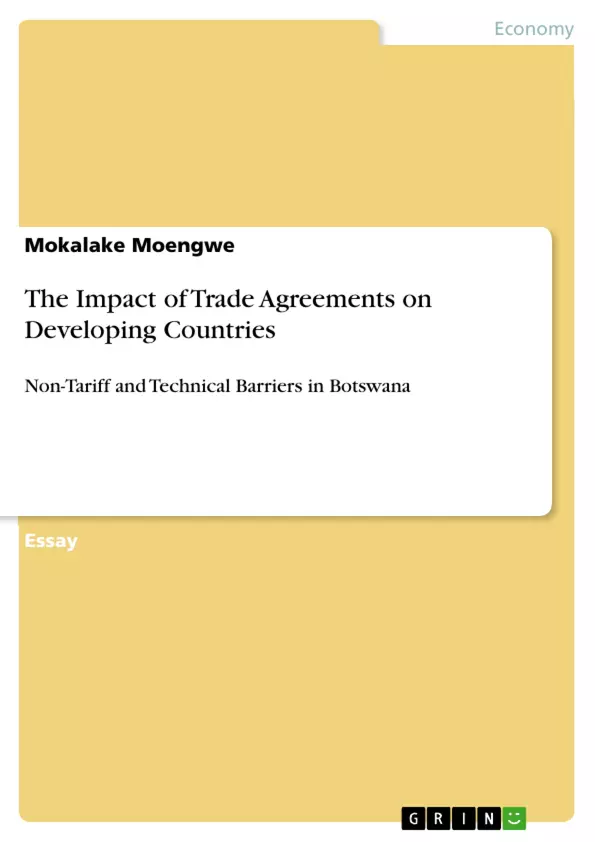An analytical look at some of the factors that contributed to the decline in beef trade of Botswana as part of the ACP group, with a sharp focus on the non-tariff barriers to trade and the technical barriers that the beef industry of Botswana is faced, with respect to the European markets
Inhaltsverzeichnis (Table of Contents)
- Introduction
- Quotas
- Competition
- Restrictions
Zielsetzung und Themenschwerpunkte (Objectives and Key Themes)
This paper aims to analyze the decline in Botswana beef exports to the European Union, focusing on the impact of non-tariff barriers and technical barriers to trade. The paper examines the role of quotas, competition from subsidized European beef, and sanitary and phytosanitary regulations in hindering Botswana's beef exports.
- Impact of Trade Agreements on Developing Countries
- Non-Tariff Barriers to Trade
- Technical Barriers to Trade
- Beef Industry in Botswana
- EU-ACP Trade Relations
Zusammenfassung der Kapitel (Chapter Summaries)
- Introduction: The introduction presents the context of Botswana's economy, highlighting its reliance on minerals and agriculture, particularly beef. It also describes the historical trade agreement between the EU and ACP countries, including the preferential access for Botswana beef exports. The introduction then highlights the decline in beef exports and introduces the focus of the paper on non-tariff and technical barriers to trade.
- Quotas: This section examines the impact of quotas imposed by the EU on beef imports from ACP countries. It explores the limitations imposed on Botswana's export growth due to these quotas and the resulting financial burden of paying duties on excess exports.
- Competition: This chapter discusses the competitive pressure faced by Botswana's beef industry from subsidized European beef production. It examines the factors that contribute to the lower price of European beef, including government subsidies and the advantages of intra-European transportation.
Schlüsselwörter (Keywords)
The main keywords and focus topics of the text include non-tariff barriers, technical barriers to trade, beef exports, Botswana, EU-ACP trade agreements, quotas, competition, subsidies, sanitary and phytosanitary regulations, Foot and Mouth Disease, and trade restrictions.
Frequently Asked Questions about Botswana Beef Exports
Why did Botswana's beef trade with the EU decline?
The decline is primarily attributed to non-tariff barriers, technical barriers, and strict sanitary regulations imposed by the European market.
What are "non-tariff barriers" in this context?
These include quotas, technical standards, and sanitary/phytosanitary regulations that restrict trade without using traditional taxes or duties.
How do EU subsidies affect Botswana's beef industry?
Subsidized European beef production lowers prices, making it difficult for Botswana beef to compete in the same markets.
What role does Foot and Mouth Disease play in trade restrictions?
Strict sanitary regulations regarding diseases like Foot and Mouth Disease often lead to bans or severe restrictions on beef imports from affected regions.
What is the significance of the EU-ACP trade agreement?
It historically provided preferential access for Botswana's products to the EU, but technical requirements have made this access harder to maintain.
- Arbeit zitieren
- Mokalake Moengwe (Autor:in), 2014, The Impact of Trade Agreements on Developing Countries, München, GRIN Verlag, https://www.grin.com/document/274822



